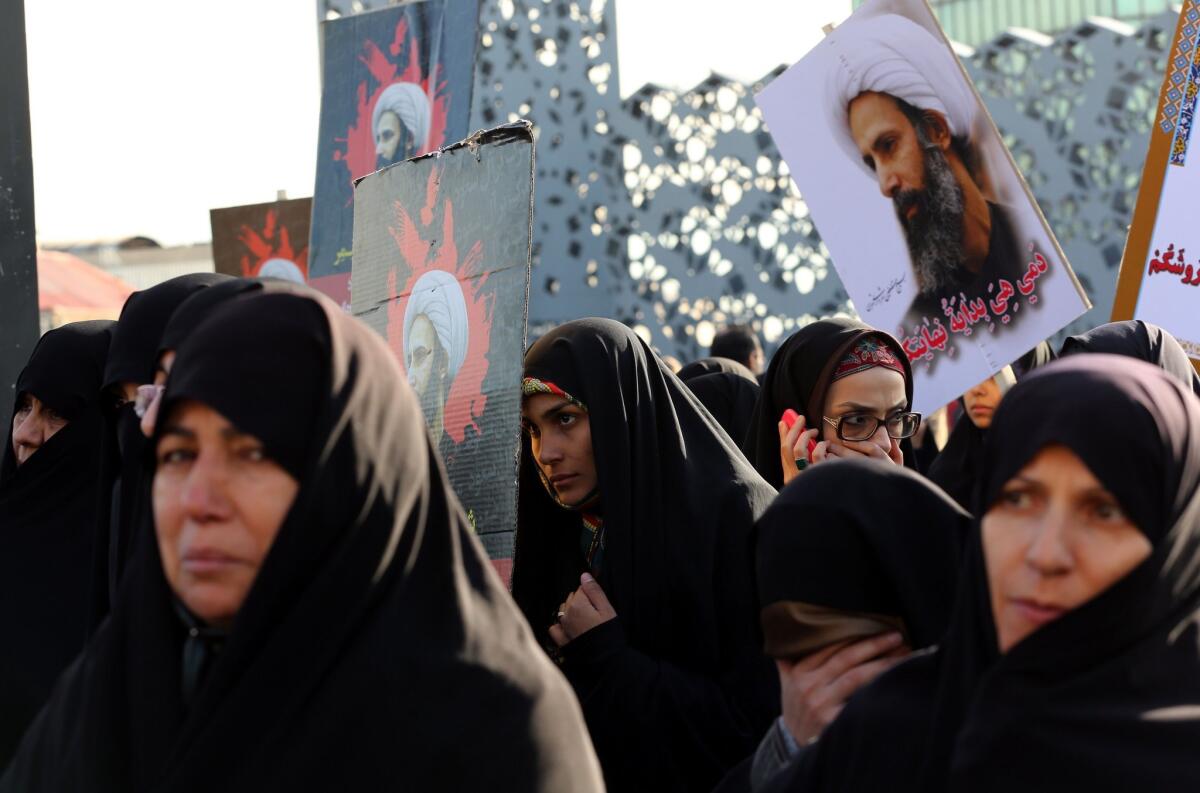Kuwait recalls ambassador to Tehran amid Saudi-Iran tension

Iranian women gather Jan. 4 during a demonstration against the execution of prominent Shiite Muslim cleric Nimr al-Nimr by Saudi authorities.
reporting from kuwait city — Kuwait announced Tuesday it has recalled its ambassador to Iran over attacks on Saudi diplomatic missions in the Islamic Republic, the latest Arab ally of Saudi Arabia to line up behind the kingdom amid rising regional tensions following its execution of a leading Shiite cleric and opposition figure.
The execution last weekend also heightened the Saudi-Iran regional rivalry, threatening to derail already-shaky peace efforts over the wars in Syria and Yemen.
Sudan and the tiny island kingdom of Bahrain said Monday they would sever ties with Iran, as Saudi Arabia did late Sunday. The United Arab Emirates announced it would downgrade ties to Tehran to the level of the charge d’affaires, while other nations issued statements criticizing Iran.
See more of our top stories on Facebook >>
The concerted campaign by Sunni-ruled Saudi Arabia highlights the aggressive stance King Salman and his son, Deputy Crown Prince Mohammed bin Salman, have adopted in confronting Iran, a longtime regional rival.
“What we have seen during the last 24 hours is unprecedented. ... It shows you Saudi Arabia has had enough of Iran and wants to send a message,” said Abdulkhaleq Abdullah, a political science professor at Emirates University. “This is the Saudis saying: ‘There is no limit to how far we will go.’”
On Tuesday, Kuwait announced the recalling of its ambassador in a statement carried on the state-run Kuwait News Agency, without elaborating. It wasn’t immediately clear how the Kuwait-Iran diplomatic ties would be affected by the move.
Tiny Kuwait is home to both Shiites and Sunnis living in peace and has the most freewheeling political system among all Gulf nations.
The diplomatic standoff began Saturday, when Saudi Arabia executed Shiite cleric Sheik Nimr al-Nimr and 46 others convicted of terrorism charges — the largest mass execution carried out by the kingdom since 1980.
Al-Nimr, a central figure in the Arab Spring-inspired protests by Saudi Arabia’s Shiite minority, long denied advocating violence. News of his execution has sparked Shiite protests from Bahrain to Pakistan.
In Iran, protesters attacked the Saudi Embassy in Tehran and its consulate in Mashhad. Late Sunday, Saudi Foreign Minister Adel Jubeir announced the kingdom would sever its relations with Iran over the assaults, giving Iranian diplomatic personnel 48 hours to leave his country.
On Monday, Saudi Arabia’s civil aviation authority suspended all flights to and from Iran, saying the move was based on the kingdom’s cutting of diplomatic ties.
Iran expressed “regret” over the attacks on the diplomatic missions in a letter to the United Nations on Monday and vowed to arrest those responsible. In the letter, obtained by the Associated Press, Iran’s U.N. envoy Gholamali Khoshroo said more than 40 protesters have been arrested and authorities are searching for other suspects.
In response to a Saudi letter, the U.N. Security Council late Monday strongly condemned the attacks by Iranian protesters on Saudi diplomatic posts. The council statement, agreed to after hours of negotiations, made no mention of the Saudi executions or the rupture in Saudi-Iranian relations.
Saudi Arabia and Iran have long vied for influence in the Middle East. Their rivalry deepened after the toppling of Saddam Hussein in Iraq and the chaos of the Arab Spring, which gave rise to proxy wars in Syria and Yemen.
World powers have sought to calm the tension. On Monday, Germany called on both sides to mend ties, while Russian state news agency RIA Novosti quoted an unnamed senior diplomat as saying Moscow is ready to act as a mediator.
The U.N. envoy for Syria, Staffan de Mistura, was en route to Riyadh on Monday with plans to later visit Tehran. Iran, a staunch supporter of embattled Syrian President Bashar Assad, and Saudi Arabia, a key backer of the opposition, have participated in three rounds of international talks aimed at ending the conflict. De Mistura has set a Jan. 25 target date for a fourth round of talks.
The White House urged Saudi Arabia and Iran to not let their dispute derail efforts to end the Syrian civil war.
RELATED:
U.S. initiatives at risk as Mideast tensions rise
Mideast rift widens as Saudi allies cut ties with Iran
Saudi Arabia cuts ties with Iran in crisis over cleric’s execution; other nations follow suit
More to Read
Sign up for Essential California
The most important California stories and recommendations in your inbox every morning.
You may occasionally receive promotional content from the Los Angeles Times.










